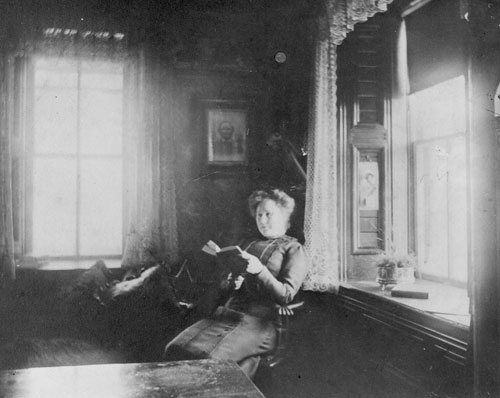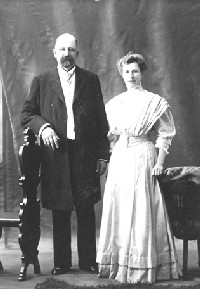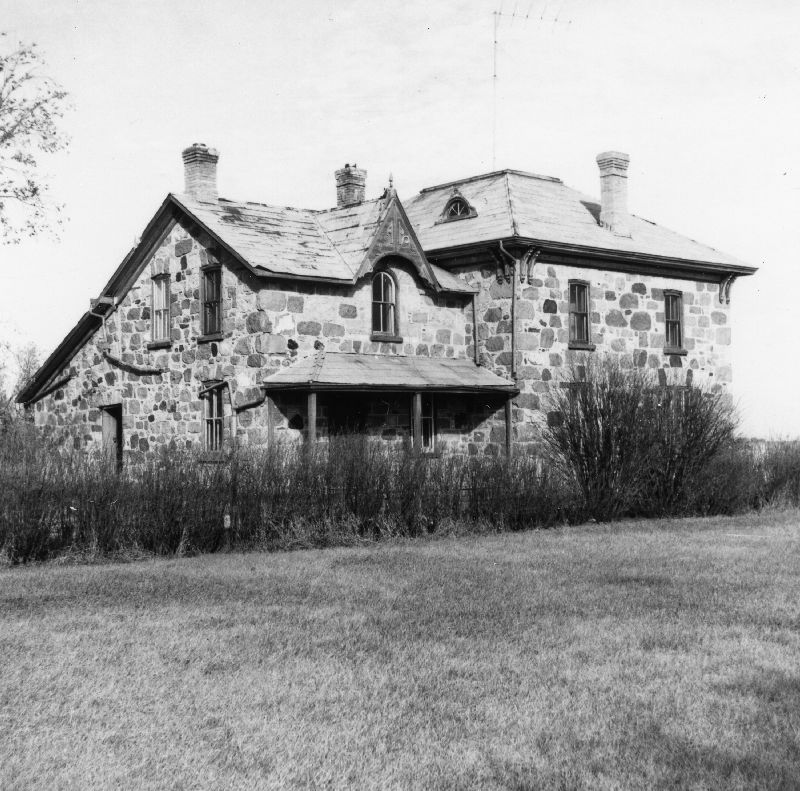Kate Gillespie
 Women also served as school principals. The 1906 Indian Affairs annual report listed eleven female principals. All worked at boarding schools, as opposed to industrial schools. Seven of them were Roman Catholic, two were Anglican, one was Methodist, and one was Presbyterian.269 One of these principals was Kate Gillespie.
Women also served as school principals. The 1906 Indian Affairs annual report listed eleven female principals. All worked at boarding schools, as opposed to industrial schools. Seven of them were Roman Catholic, two were Anglican, one was Methodist, and one was Presbyterian.269 One of these principals was Kate Gillespie.
Born in Ontario in 1866, she moved to the Qu’Appelle Valley along with her parents in 1889. She worked as a rural schoolteacher, and her contact with some Aboriginal students led her to volunteer for missionary work in Canada. After teaching at day schools on reserves near Kamsack and Prince Albert, she was appointed principal of the File Hills school in 1901, a position she held until her marriage in 1908. Her sister Janet came to work at the school as matron, and her father became the farm instructor.270 Between 1901 and 1904, Kate and Janet Gillespie together contributed a third of their combined income to the school.271 Principal Gillespie was highly regarded. In 1911, when her successor resigned, Indian Commissioner W. M. Graham wrote that the school in recent years “had fallen away very much.” When Gillespie had been principal, “the pupils who were turned out had a thorough training in all lines of farm work.” Graham pointed out that the last farm instructor (who had been “sent up from Toronto”) “had no discipline or authority and besides was sickly and complained about the hours.”272 ( From NCTR Report: The History, Part 1 Origins to 1939, Vol. 1, pp. 716-717)
____________________________________________________________

Kate Gillespie of the File Hills Presbyterian Boarding School which adjoined the Okanese reserve, “was appointed principal in 1902, the year after the colony was established, and she maintained an avid interest even after she left missionary work [in 1908] to marry W.R. Motherwell, a local farmer and Liberal politician. Motherwell became minister of Agriculture in the first Saskatchewan government (1905-18) and later federal minister of Agriculture (1921-30). As his wife visited the colony regularly so did the minister of Agriculture, often giving lectures on farming and this connection with government may account for some of the public attention the colony received over the years.” Immigration and Settlement 1870-1939; Gregory P. Marchildon (Ed.) p. 242
_____________________________________________________________
For Ann Thomas Callahan, a survivor and former Residential Schools Steering Committee member, the best part was meeting with classmates of the Birtle school to tell stories, but she didn’t want to tell her own story again to the TRC. At the Academic Conference, after hearing Presbyterian minister the Rev. Peter Bush deliver a paper on “The Gillispie Sisters and File Hills Residential School,” Ann spoke of her mother’s [Nora Keewatin] happy relationship with Kate Gillespie (later Mrs. Motherwell). Ann found it enlightening to hear the daughter of former students explain how she had been impacted by her parents’ behaviour and attitudes shaped by the residential school. (Residential Schools Update. The United Church of Canada, January 2010) See also Ann’s Thesis On our Way to Healing: Stories for the Oldest Living Generation of the File Hills Indian Residential School
[Ann’s father, John Thomas, was one of the first Colony members: “Agent Graham consulted school personnel to choose the students. Fred Deiter became the first colony member in 1902. Others were Francis Dumont, John R. Thomas, John Bellegarde, Ben Stonechild, Joe Ironquill, Joe McKay, McGlory Bellegarde, F. Fiddler and Alex Brass.” (Donna Pinay, 1974, July, The History Of The File Hills Farming Colony. Saskatchewan Indian, 04(06),17 )
_____________________________________________________________
Excerpt from Shingwauk’s Vision:
“A second revealing situation was created when a school was placed under the care of a female principal. Such was the situation at the Presbyterians’ File Hills boarding school during the first decade of the twentieth century, when Kate Gillespie’s many talents and hard work ensured her appointment even though Indian commissioner David Laird would have preferred a male principal.80 Her obvious ability did not, however, ensure Gillespie equitable salary treatment. ‘I must confess to being a little piqued,’ she wrote to the head man in Toronto, ‘that the Committee should ask me because I am a woman to fill a position for a salary less than they had ever paid to any man. I suppose that is the misfortune of being a woman but I care not for the salary itself further than that it would enable me to do perhaps a broader work. I agree to take the $450.00 and pay $2.00 a week for my board.’ Three years after Gillespie’s elevation to principal, she was still the worst paid Presbyterian principal in the Manitoba and Saskatchewan region, and she and her sister between them had contributed some $550 to the operation of the school. 81 The women had been able to assume direction of the school only because their aged father lived with them. On his deat, although he did not do much in running the school but was ‘a protection’ for them, a crisis occurred. Temporarily an uncle from Colorado resided with them, but by the late summer they were on their own again. 82 Under their direction File Hills operated smoothly, so well, in fact, that it became a convenient place to send a female worker who had got herself into an awkward spot by becoming too familiar with an older male student at one of the Presbyterians’ other schools.83
Although Kate Gillespie did a creditable job operating the File Hills school, gender and contemporary attitudes continued to complicate her life as principal of a boarding school. When church authorities were looking into the appointment of a new staff member, Gillespie was more concerned about the fact that he was a male than that he was from the United Kingdom. ‘I would rather have a Canadian if it were possible to secure one as old country men often find it hard to fit into our ways of doing things but seeing he is Scotch,’ she wrote, ‘he should be all right.’ However, there was the issue of relations between a male employee and a female supervisor. ‘Being a woman my position here is a delicate one. A stranger coming in might come with the idea that because he is a man he is supposed to manage things himself regardless of me,’ she worried. ‘I would like him to understand that my authority in the School is just the same as is invested in any male Principal.’84 An even greater complication was her acceptance of a proposal of marriage in 1908. It went without saying that she would have to leave ‘the work,’ but she retained her strong interest in the boarding school and the File Hills Colony. She thought that the ‘man who comes to File Hills’ to replace her would have to be a strong individual to earn the respect of both the Indians and Indian Affairs official William Graham. She apparently did not contemplate the likelihood of a woman replacing her, though in face on did.85
Her replacement, Miss Cunningham, encountered even greater problems that Kate Gillespie Motherwell had. When it came time to hire a new farming instructor, Indian Affairs thought the greatest care was necessary ‘owing to the fact that the Principal of this school is a lady.’86 The new man had not been at the school long before he was complaining and giving notice. ‘Two members of staff,’ he wrote, ‘ the teacher and matron are fine persons but the Principal – I will say no more.’ It was interesting that church officials concluded that the difficulty should be resolved by freeing the farming instructor from the administration of a woman. ‘I recognize the delicacy of the situation,’ observed the Presbyterian head of missionary work, ‘because it is usual to allow the Principal to direct all matters connected with the School. That a practical farmer, however, should be subject to the direction of a lady principal, might prove and apparently does prove impracticable.’87 Given the fact that File Hills was getting a larger school building, the department pressed for a ‘male principal or the permanent engagement of two men.’ That ‘is the only solution satisfactory to the Department and in my judgment the only guarantee for efficient work, more particularly when the school is so closely connected with Inspector Graham, a man who is impatient of anything but full efficiency.’88
Endnotes:
80 PC, FMC, WS, IWMNW,box 2, file 32, D. Laird to R.P. MacKay, 2 Dec. 1901
81 Ibid., file 31, K. Gillespie to R.P. MacKay, 14 Nov. 1901; box 4, file 68. Report of Synod’s Commission on Indian Affairs, Dec. 1904, 15; bid., file 70, K. Gillespie to R.P. MacKay, 27 Feb. 1905. Gillespie’s responses to inquiries about her and her sister’s expenditures were that they were glad to do it; that they would spend more if they could to save the children from the Roman Catholics; and that they were vexed that their investment had become known. Gillespie to MacKay, 27 Feb. 1906.
82 Ibid., file 38, Kate Gillespie to R.P. MacKay, 23 June 1902: ibid., file 39, same to same, 25 July 1902.
83 Ibid., box 5, file 107 Kate Gillespie to Miss Criag, 16 March 1908. At the request of Miss Craig, Gillespie was reporting confidentially on the temperament and potential of the woman worker from Alberni.
84 Ibid., file 74, K. Gillespie to R.P. MacKay, 30 June 1905
85 Ibid., file 111, K. Gillespie to R.P. MacKay, 13 July 1908
86 Ibid., box 6, file 130, J.D. McLean to R.P. MacKay, 12 Jan. 1911
87 Ibid., file 133, R. P. MacKay to J. Farquharson, 26 April 1911: ibid; James Montgomery to MacKay, 29 April 1933
88 Ibid., W.W. McLaren to R.P. MacKay, 14 June 1911. For aditional argments for a male principal for Crowstand school, see ibid., box 3, file 45, W. McWhinney to R.P. MacKay, 2 Jan. 1903.
Source: Shingwauk’s Vision: A History of Native Residential Schools, p. 237-239
________________________________________________________
“Domestic Bookkeeping” An Address by Mrs. W. R. Motherwell in Report of the first annual convention of the Homemakers’ Club of Saskatchewan held at Regina, Sask., Jan. 31, Feb. 1, 2, and 3, 1911. Saskatoon: s.n, 1911.
Motherwell Homestead National Historic Site of Canada, Parks Canada
